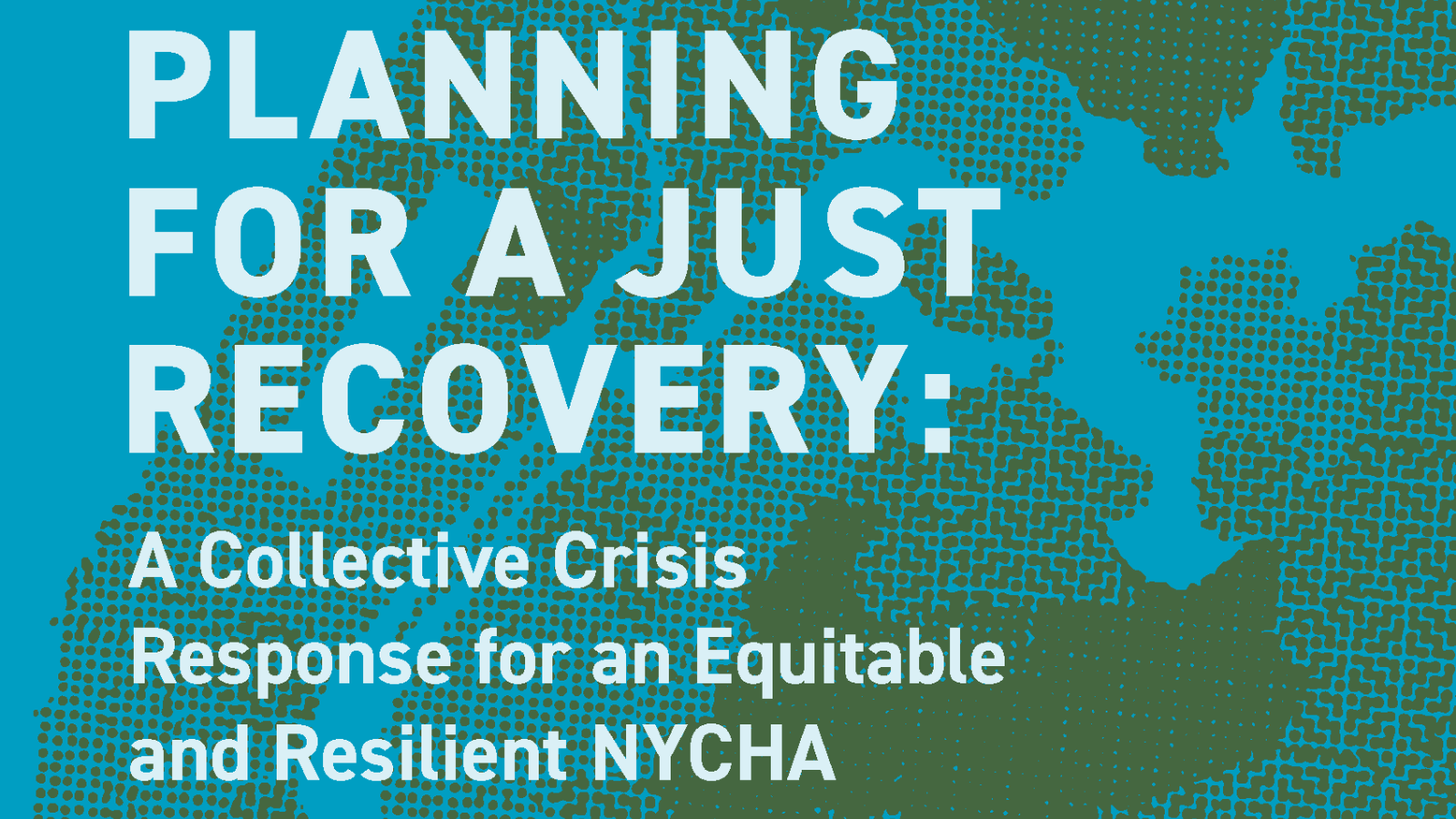HESTER STREET PUBLISHES PLANNING FOR A JUST RECOVERY: A COLLECTIVE RESPONSE FOR AN EQUITABLE AND RESILIENT NYCHA REPORT
Report was developed by a working group of 20 organizations and NYCHA residents from 14 developments citywide, with support from the Ford Foundation
NEW YORK, NEW YORK – MARCH 11, 2021
Hester Street is excited to announce the publication of a new report Planning for a Just Recovery: A Collective Response for an Equitable and Resilient NYCHA that focuses on lessons learned and recommendations focused on NYCHA and its residents in the face of the COVID-19 crisis. The report is the result of a months-long collaborative Working Group process led by Hester Street and Rasmia Kirmani-Frye, supported by the Ford Foundation.
Long before the COVID-19 pandemic devastated New York City, the New York City Housing Authority (NYCHA) and its residents struggled with physical, economic and social disparities, resulting from systemic racism and federal disinvestment. In the fall of 2020, a multi-sector Working Group and NYCHA residents representing 14 developments across the city convened to develop a Collective Response Strategy focused on short and long-term recommendations to address the COVID-19 response and promote long-term resiliency for a just NYCHA recovery. The Final Report can be found here: https://bit.ly/2N0Pye3.
The pandemic and its devastating impacts threaten the long-term health and well-being of over 365,000 NYCHA residents and the city’s political economy. Over 90% of NYCHA residents are people of color, who have been disproportionately impacted by COVID-19. This pandemic provides an opportunity to examine present day impacts of historical inequities, reflect on lessons from this and recent crises and identify better responses for future emergencies. This Collective Response Strategy provides immediate and aspirational actions that can both support ongoing emergency management, and serve as a foundation for long-term resilience.
Key findings from the Report include:
— The pandemic exacerbated the economic vulnerability of NYCHA residents. In a survey of almost 10,000 NYCHA residents conducted in June 2020, at least 32% experienced a loss of employment. Residents engaged in the development of this Report expressed that while the crisis has brought enormous economic hardship, it creates opportunities for NYCHA residents and resident owned businesses to have prioritized access to crisis response contracts.
— A need to establish clear roles and responsibilities and data sharing protocols between government and Community Based Organization before and the immediate aftermath of a crisis to avoid gaps or duplication in vital crisis relief service.While many city agencies and CBOs jumped into action immediately, coordination and sharing of data between these sectors can be improved for future crises.
— Many NYCHA resident to resident networks self-organized and were incredibly successful in providing critical resources and supplies in the immediate aftermath of the lockdown. Their success in reaching the most vulnerable NYCHA residents demonstrated that resources should be invested in maintaining and replicating such resident-led networks for crisis response and day to day outreach to the hardest to reach NYCHA residents.
Immediate recommendations from the Report include a call for the creation of crisis mode city contracting and procurement mechanisms that can get funding into the hands of Community Based Organizations and resident led groups in the immediate aftermath of a crisis quickly. It also recommends expansion of training, recruitment and hiring of NYCHA residents to perform crisis related jobs. The Report is also a call-to-action to galvanize a diverse group of actors to leverage their networks and join forces with NYCHA residents to build civic will, implement these recommendations, and develop a shared agenda for collective action.
Supported by the Ford Foundation, the cross-sectoral Working Group member organizations that contributed to this Report include NYCHA, Department of Health + Mental Hygiene, NYC Office of the Deputy Mayor of Housing + Economic Development, Mayor’s Office of Criminal Justice, NYC Housing Development Corporation, Hester Street, Henry Street Settlement, Red Hook Initiative, LISC-NYC, NYC Employment + Training Coalition, Community Services Society, Community Voices Heard, GOLES, NYCKids Rise, Center for Court Innovation, Urban Upbound, and Association for Neighborhood and Housing Development.
The Final Report can be found and shared here: https://bit.ly/2N0Pye3.
“It’s really simple. Government, nonprofits and philanthropy have to listen, work alongside or in some cases step aside to form authentic and responsive relationships with NYCHA residents. This report highlights how much work is needed from government, nonprofits and philanthropy to address the harms of disinvestment and systemic racism. As a community of non-residents we cannot continue to repeat the patriarchal approach that says we know best. Instead it’s time to pivot and become part of the Mutual Aid network that is the NYCHA residential community. We can become the best consultants and supporters of public housing preservation, health equity, healing and self determination if we choose to abandon our past thinking.” — Javier Lopez, Chief Strategy Officer, Red Hook Initiative
“Henry Street Settlement, and all settlement houses, operate on the fundamental belief that the most important voice in any community is that of its residents; this is especially true with respect to NYCHA. The COVID 19 pandemic has exposed the deep inequalities faced by public housing residents on the Lower East Side and across New York City in all of the primary areas of human services: employment, education, healthcare, food security, technology access, and safety. This report aims to center and value the expertise of those who live in public housing developments and a constellation of stakeholders who care about equality, justice, and progress for the most marginalized and those impacted in a devastating way by the pandemic. The next necessary step is collective advocacy so we can activate these recommendations. With over 127 years of crisis response and leadership in the everyday fight against poverty, Henry Street Settlement is grateful to participate in this critically important effort.” — David Garza, President & CEO, Henry Street Settlement
CVH has always been committed to building power with public housing residents. While COVID further exposed the impact of systemic racism and pre-existing inequities on public housing residents, it also demonstrated the power of NYCHA residents to care for each other and continue to fight for change. The Working Group and Resident Focus Group, and the resulting Collective Response report, articulates what we have always known – residents know best what they need, and it will take collective action to create a just and resilient NYCHA. — Afua Atta-Mensah, Executive Director, Community Voices Heard
“Working together to build civic and political will to harness our collective resources to safeguard the future of public housing should be a top priority for all of us. This process, led by Rasmia Kirmani-Frye and Hester Street, modeled an example of how diverse stakeholders can come together to continue to tackle these complex issues and to further build trust among each other. Trust will be a key ingredient for long-term systemic change.” — Debra-Ellen Glickstein, Executive Director, NYCKids RISE
“Public housing—affordable, accessible, and accountable—is a critical part of New York City, and its residents are many of the people who make this city work, especially during a pandemic. And yet NYCHA residents have been some of the people hardest hit by COVID-19. As this much-needed report makes clear, it is residents who know best how to fix and strengthen NYCHA to meet the next crisis, and it is residents—through training, employment, and economic opportunities—who need to be at the center of that effort.” — Courtney Bryan, Executive Director, Center for Court Innovation
“The ongoing preservation and improvement of public housing in New York requires that we continue to forge stronger alliances and partnerships that center the lived experiences of NYCHA residents. Building on this report, we look forward to supporting the ongoing planning, research and engagement necessary for building a broader, multi-sector civic coalition that supports the kinds of local, state and federal policy actions and investments necessary for revitalizing and preserving public housing.” — Jerry Maldonado, Director, Cities and States, Just Cities, Ford Foundation
For press inquiries, please contact: Alphonse Tam, alphonse@hesterstreet.org.


